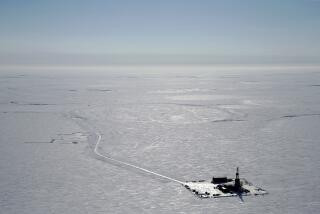Shell announces bid to begin oil drilling in Beaufort Sea off Alaska
- Share via
With the BP oil well blowout in the Gulf of Mexico successfully contained, Shell Alaska announced Wednesday that it had filed an application to proceed with exploratory offshore drilling in the Beaufort Sea off Alaska.
The Obama administration suspended all offshore operations in the remote, fragile Arctic seas this year after the BP spill, but Shell officials said they had prepared a more robust oil blowout containment plan and were ready to proceed next summer with a single well 17 miles off the North Slope.
The company said it was postponing an even more controversial plan to drill in the more-distant Chukchi Sea until litigation over that proposal was resolved.
“We think we’ve got what we need in place to make a strong program even stronger,” Pete Slaiby, Shell Alaska’s vice president, said in a conference call with reporters in Anchorage.
The company has not submitted a new exploration plan, as drilling critics have sought, but has scaled back its original drilling schedule and put into place new oil spill containment equipment, including a dome that could be quickly put over a leaking well and a beefed-up blowout preventer.
In addition, Shell said it was proposing to install a subsea panel that would allow the blowout preventer to be engaged in an emergency, even if the connection were lost between the emergency device and the surface drilling rig.
But it is unclear whether the Bureau of Ocean Energy Management, Regulation and Enforcement will approve the permit application or require additional measures.
Unlike the BP deep-water operation in the Gulf of Mexico, Shell’s proposed exploration well in the Beaufort Sea would be drilled in just 108 feet of water, with what company officials said would be much lower well pressures.
Conservationists have sought to halt any drilling in Arctic waters until more studies are done to measure the potential effects on species such as bowhead whales and polar bears, and the ability of the delicate, frigid Arctic environment to recover from an oil spill and expanded industrial activity.
They have advocated preparation of a full environmental impact statement before any new drilling is undertaken; the federal government, as in the Gulf of Mexico, has concluded that expected environmental effects are not significant enough to warrant a full report.
“They really should be required to submit a whole new operation plan anew, given what we learned in the Gulf of Mexico, including that there could be a blowout from this type of [exploration] activity,” said Michael LeVine of the conservation group Oceana in Juneau, Alaska.
kim.murphy@latimes.com
More to Read
Sign up for Essential California
The most important California stories and recommendations in your inbox every morning.
You may occasionally receive promotional content from the Los Angeles Times.













